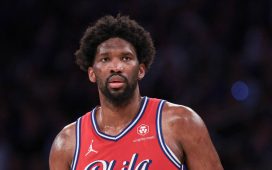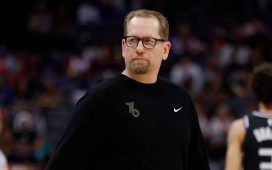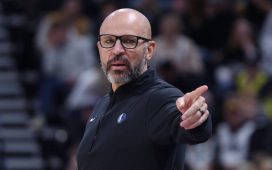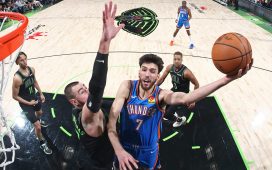SEATTLE — What do I have to do around here to buy a cap that reps the best team in women’s basketball?
That’s what I was thinking last week as I walked the streets of downtown Seattle, home of the W.N.B.A. champions, the Storm.
In sports paraphernalia shops, I hunted for a green-and-gold Storm cap, a T-shirt, or maybe a replica of the team’s new black jerseys, anything that would show off my love for one of the premier teams in sports.
What I found were stores filled with Seahawks, Mariners and Washington Huskies swag. I saw eager customers buying caps affixed with the ice blue “S” that represents the Kraken, the new N.H.L. team in town. The Kraken’s first game isn’t until next month.
Each time I asked for Storm merchandise, I was met with bewilderment and surprise. One salesperson suggested Storm gear would surely sit untouched because of the demand for Russell Wilson jerseys. Another told me she could sell me a Storm bumper sticker, but she wasn’t sure where it was.
Disappointed, I drove to a nearby suburb and found a sporting goods store in a mall. Here my question was answered with this:
“Who are the Storm?”
In their 21 years of existence, the Storm have been remarkably consistent. They hold four W.N.B.A. titles. The first came in 2004. The last in 2020. As the league heads into this season’s playoffs, which start this week, they are once again among its top four teams and stand a good chance of repeating as champions.
Leading the reigning champions are three athletes of remarkable distinction. Jewell Loyd is an offensive spark plug with a game fashioned after Kobe Bryant, who was one of her mentors. Breanna Stewart, the league M.V.P. in 2018, is possibly the best player in the women’s game. Sue Bird, one of her sport’s few breakout stars, has spent her entire professional career in Seattle.
These three women helped the United States win the gold medal at the Tokyo Olympics. At the opening ceremony, Bird carried the American flag in the parade of athletes.
That’s who the Storm are.
And yet in the stores I visited last week and on the streets of a city that touts itself as deeply progressive, I saw nothing to indicate that Seattle has a W.N.B.A. team, let alone passion for one.
Merchandise is a metaphor, a signpost of something else: cultural capital. They don’t call all those hats, shirts, jerseys and sweatshirts “swag” for nothing, and the prevalence of it — or, in this case, the lack of it — speaks to something profound.
The signal sent when gear is so hard to find and so rarely seen? Women remain an afterthought, which hits especially hard for a team sport played predominantly by Black women.
The players notice.
“You don’t see us repped as much as we should be,” Loyd told me, still sweating after a hard practice last week. “It is almost impossible to find a jersey. We are like a hidden gem. To put all of this work into something and we are not seen, what else do we have to do? We’ve won championships here and brought value to our city, and yet you can’t find a jersey?”
There is nuance to this story, though. True, in its 25th year, the W.N.B.A continues to struggle for hearts and minds. But after last season, when the league burnished its reputation for excellence and solidified itself as a leader in the fight for social justice, it is also making inroads.
While viewership for most sports is declining in an era of cable television cord-cutting, the W.N.B.A.’s national broadcast ratings are on the rise. Player salaries are climbing, too, and several of the league’s stars feature in national advertising campaigns for large corporations. Eight players signed deals recently to represent Nike’s Jordan Brand, a number once unthinkable. In a first, one enduring star, the Chicago Sky’s Candace Parker, fronts the popular NBA 2K video game.
The league has also successfully courted backing from companies such as Google, Facebook, AT&T, Nike and Deloitte, the professional services firm helmed by Cathy Engelbert before she moved to the W.N.B.A. in 2019 to serve as its commissioner.
When I interviewed her last week, Engelbert spoke of the need to change and amplify the league’s narrative. She hailed the devoted, diverse, youthful and socially progressive fan base. She wants the W.N.B.A. valued in new ways that go beyond old metrics like Nielsen ratings.
When I mentioned I rarely saw Storm gear in Seattle, my hometown, she hardly seemed surprised.
“We need to do better” at marketing and telling the league’s story, she said. If that happens, sales of merchandise will rise, along with overall popularity. “I mean, everyone should know who Sue Bird is,” she said. “She happens to be one of our household names, but we don’t have enough of them.”
The commissioner also singled out the importance of selling the game by highlighting individual stars and the intense rivalries among players and teams, akin to how the N.B.A. grew when Magic Johnson and Larry Bird came to that league.
One such rivalry, between the Storm and the Phoenix Mercury, was on full display on Friday night.
It was Seattle’s final regular-season game. Both teams had qualified for the playoffs, but much was on the line, including bragging rights between two organizations that have a history of epic clashes. More important, the winner would also get to skip the postseason’s first round.
At that game — played 30 miles north of Seattle because the team’s typical arena is being renovated — I finally found rabid fans wearing their Storm swag. Caps, T-shirts, socks, face masks, sweatbands. A few fans donned green-and-gold shoes with player autographs. Some wore the uniforms of Bird, Loyd and Stewart from the Olympic team.
Before 6,000 spectators instead of the 2,000 typically at the Storm’s temporary home, the teams put on a showcase of flowing, fast-paced basketball. Despite being without Stewart, who is nursing a foot injury, Seattle came out firing. Loyd hit a barrage of midrange jump shots and deep 3-pointers. On her way to a career-high 37 points, she scored 22 in the first quarter.
The Storm won, 94-85, delighting a boisterous, fun-loving crowd. It was easy to feel the team’s intensity and to see how its firm base of loyal and diverse fans powered the W.N.B.A.
But outside of such fans, away from its arenas, the league mirrors society and its inequities. All you need to do is walk the streets of Seattle and shop for a Storm cap to see that.





